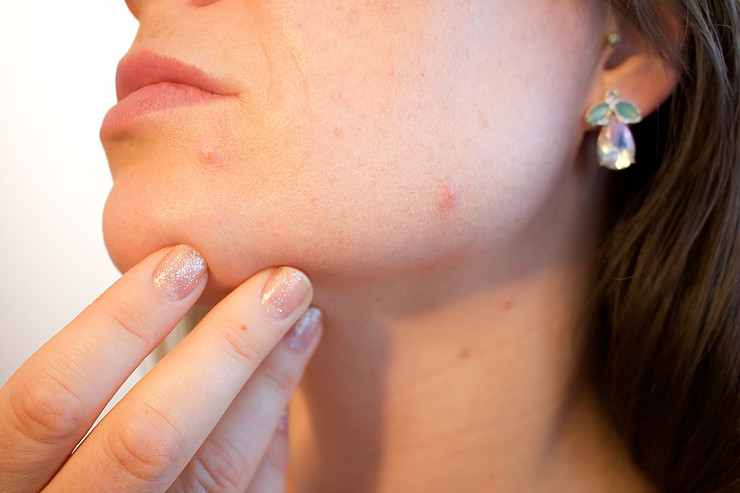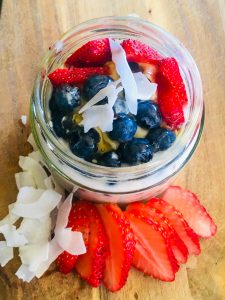Anyone who has suffered from acne knows how challenging it can be, not only to treat but also to remain confident, self-assured and settled when your skin is breaking out. Many health conditions are invisible to anyone other than ourselves yet acne is a different story and is often “on display” for all to see. It’s a fallacy that skin breakouts are related to ones hygiene yet for many this belief persists. This can lead to feeling those with acne feeling dirty or shameful, potentially exacerbating low self esteem.

The causes of acne are commonly misunderstood, and there are many more myths surrounding it. One myth is that it’s purely hormonal. Many skin conditions, acne included, are inflammatory in nature. While sex hormone imbalances are one part of the picture, insulin resistance, nutritional deficiencies and microbial dysbiosis are other parts of the acne vulgaris puzzle.
It’s also wrongly said that diet has nothing to do with your skin health. This was based on outdated studies that didn’t demonstrate a link. However in recent years better research has disputed this, showing that diet does have a large role to play in acne. Dairy has been shown to be a trigger on its own as well as a diet based on high glycemic load foods (such as refined carbohydrates and sugar).
Where the gut fits in
As research into gut health and our microbiome is booming, it is becoming more accepted that gut health does indeed affect our skin, something that has long been understood in naturopathic medicine. There are articles in the literature dating back 70 years reporting a link between the gut and skin health, yet it’s only recently this has become more broadly accepted among some doctors and dermatologists. While many are still discovering this for themselves a quick pubmed search will bring up various articles relating acne to diet, digestion and small intestinal bacterial overgrowth (SIBO) showing the connection.
“All disease begins in the gut”
Hippocrates
One such study demonstrated a link to an increase in digestive symptoms among adolescent acne sufferers. They found halitosis (bad breath), constipation, acid reflux and bloating was more common in those suffering acne than those without. There are also several studies showing that leaky gut was significantly more common in those with acne than controls, even in those who had no gut symptoms at all. SIBO is another gastrointestinal condition with a connection to acne.
What we don’t know as yet for many of these connections is the exact mechanism behind them. Is SIBO linked to acne because it can contribute to leaky gut (therefore more inflammation) or is it because its associated with deficiencies in Vitamin B12 as well as vitamins A, D, E, and K (fat-soluble vitamins) that are all essential for optimal skin health and overall good health? Or is it both?
While we may not understand why as yet, we do know it occurs and can no longer be disputed that the health of our gut has the capacity to effect our skin.
What is leaky gut and why is it such a big concern for skin health?
Leaky gut essentially means things that are supposed to remain within your gut are leaking through in to the blood stream, potentially triggering immune reactions and inflammatory responses. Leaky gut is essentially a breakdown of gut integrity and occurs when the gut has become damaged. Many things can damage our gut wall such as what we eat (our diet), what we don’t eat (nutritional deficiencies), medications such as antibiotics and certain anti-inflammatories (NSAIDs), alcohol, chronic stress, dysbiosis as well as gastrointestinal pathogens infections (bacteria, parasites, fungi).
Leaky gut is believed to be one of the main drivers of both local and systemic inflammation and for many this can manifest in the skin.
With inflammation a driver in acne, a damaged gut wall that allows toxins, microorganisms, and food proteins across into the blood stream can significantly contribute to the immune activation and inflammation underlying the process. Leaky gut can also contribute to acne via the reduced capacity for nutrients to be absorbed. A damaged, inflamed gut cannot perform its usual roles properly with absorption of key nutrients from our food and drink being one such vital role.
Turning it around- the Naturopathic approach to acne
I’m sure by now you can guess where we are going with this? That the approach I take in clinic will be food and gut-based first. That sorting out triggers within ones diet and addressing their gut health is not only paramount for glowing results but will also provide the solid foundation for any other additional treatments to be effective should they be needed.
When you meet with me you will find I ask lots of questions around your digestive health to piece together the parts of the puzzle that are relevant for you. I may utilise specialised testing to screen for leaky gut, dysbiosis, SIBO or parasites if I feel it to be warranted. Your environment, stress levels and emotional health are also taken into account as these contribute to the total load on your physical body.
At times added support many be needed to improve insulin sensitivity, to balance sex hormones and correct nutritional deficiencies. However it is my opinion these can only ever be effective if your gut health has been optimised, and how you care for yourself through what you choose to eat has been addressed.
Share the love

About Sandi
Sandi Cooper is an experienced Naturopath working in clinical practice for almost two decades. Her clients love her down-to-earth approach and her naturally caring qualities. Although Sandi is experienced in most areas of clinical practice, she has a special interest in children’s health and nutrition, working with parents to get the best outcomes for their children.




